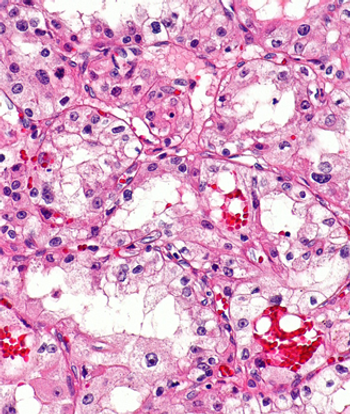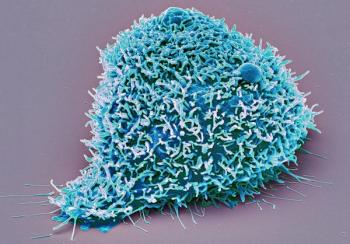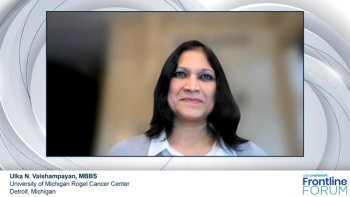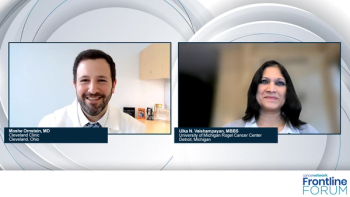
Kidney Cancer
Latest News

Latest Videos

CME Content
More News

Patients with advanced clear cell renal cell carcinoma are “unlikely” to experience a clinically meaningful decrease in overall survival following planned treatment cessation with a tyrosine kinase inhibitor.

Lenvatinib and pembrolizumab’s benefit proves to be long-lasting and significant in first-line advanced renal cell carcinoma, according to an expert from University of Bari 'A. Moro'.

Shared insight from Terri Blalock and her caregiver, Kaitlin Blalock, regarding the diagnosis of renal cell carcinoma Terri received following a number of symptoms.

Expert oncologist Hans Hammers, MD, PhD, spearheads an overview on renal cell carcinoma, covering its current incidence and known risk factors.

An ongoing exploratory biomarker analysis of the CheckMate 9ER trial set out to identify predictive biomarkers or a composite model of response of nivolumab/cabozantinib efficacy in advanced renal cell carcinoma.

Results from cohort A of the HCRN GU16-260 trial showed treatment-free survival was enhanced in patients with advanced renal cell carcinoma who received nivolumab monotherapy plus salvage nivolumab and ipilimumab maintenance.

89Zr-DFO-girentuximab improves sensitivity and specificity in identifying clear cell kidney cancer compared with any metric to date, according to an expert from the University of California, Los Angeles.

Patients with locally advanced or metastatic renal cell carcinoma with a clear-cell component who receive first-line cabozatinib after checkpoint inhibitor combination therapy appear to have early responses.

Updated results from the phase 3 CheckMate 9ER trial continue to support nivolumab plus cabozantinib as a first-line treatment for patients with advanced or metastatic renal cell carcinoma.

When combined with nivolumab and ipilimumab, cabozantinib appears to improve outcomes over placebo for patients with advanced, intermediate-risk renal cell cancer, and showed some efficacy among the poor-risk population.

The addition of everolimus to vorolanib appears to improve outcomes in metastatic renal cell carcinoma.

Experts review key clinical data and current treatment strategies for renal cell carcinoma following updates from the 2022 IKCS meeting.

Treatment with nivolumab plus ipilimumab appears to result in overall survival and progression-free survival benefit in patients with intermediate- or poor-risk sarcomatoid renal cell carcinoma.

Experts Ulka N. Vaishampayan, MBBS, and Moshe Ornstein, MD, look toward the future treatment paradigm of both clear cell and non–clear cell renal cell carcinoma.

Before closing out their discussion on renal cell carcinoma, key opinion leaders highlight efforts to optimize the management of non–clear cell disease with immunotherapy.

Findings from the phase 3 LEAP-002 study indicate that the addition of pembrolizumab to lenvatinib did not impact quality-of-life scores among patients with hepatocellular carcinoma.

Lenvatinib yields survival benefit in hepatocellular carcinoma following progression on immunotherapy.

An expert from the University of Texas MD Anderson Cancer Center discussed kidney cancer treatment updates from a recent medical conference.

Contextualizing discussion with clinical trial data and real-world experience, expert hematologist-oncologists consider the role of adjuvant therapy in managing advanced RCC.

Shared insight from Ulka N. Vaishampayan, MBBS, and Moshe Ornstein, MD, on unmet needs in the setting of clear cell and non–clear cell renal cell carcinoma.

Data from a meta-analysis suggest that single-fraction stereotactic ablative body radiotherapy could result in a lower incidence of local failure than multifractionated radiation in patients with renal cell carcinoma.

Key opinion leaders reflect on novel treatment modalities still under investigation for the management of advanced renal cell carcinoma.

Expert hematologist-oncologists share comprehensive perspective on an array of first-line clinical trials in the setting of advanced renal cell carcinoma.

A brief review of common adverse events inherent in the first-line management of advanced renal cell carcinoma and practical advice on how to mitigate treatment toxicity.

Opening their discussion on the advanced renal cell carcinoma treatment landscape, experts Ulka N. Vaishampayan, MBBS, and Moshe Ornstein, MD, identify cornerstone first-line regimens.





































